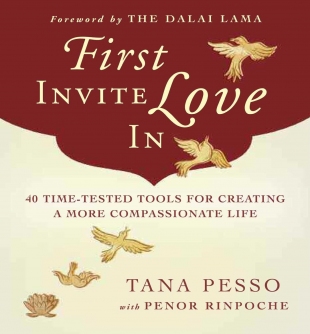Tana Pesso, who holds a master's degree in public policy from the Kennedy School of Government, Harvard University, has taken the meditations by Penor Rinpoche (1932 - 2009), an exemplary master of the Tibetan tradition, and brought them to the world in this extraordinarily helpful paperback of 40 compassion practices. She sees herself as "the vehicle to provide a cultural translation of the precious and powerful" teachings he taught and lived. In the introduction, Pesso gives some advice for using this book: Do the exercises in order and don't skip steps. Practice regularly, and trust yourself.
The Tibetan Buddhist tradition emphasizes that compassion can be taught and learned: opening the heart towards all living beings brings a peace of mind that is astonishing. Further, they believe that every human being is born with a yearning to be kind and compassionate. It takes time and the three p's of patience, practice, and perseverance to draw out our innate goodness. There are three segments to each of the guided meditations here and they are meant to be done in succession, since each builds on the other. The back of this paperback contains a short version of each exercise for brief reminders of the practice path.
Among the 40 guided meditations are the following: Thinking of Friends as Kind Mothers; Bearing Compassionate Witness to Suffering; Widening the Heart to Embrace the World with Loving-Kindness (Sunshine Metaphor); Taking Compassion into Daily Life: Feeling Compassion for Strangers; Connecting the Body and Actions with Compassion; Thinking of Animals as Kind Mothers; Overcoming Jealousy and Envy to Rejoice for the Emotional Happiness of Others; and The Ultimate Compassionate Force: Dissolving the Dualistic Mindset. Here is a sample brief compassion practice:
Thinking of People You Don't Like as Kind Mothers
"Think about someone who has upset, irritated, or angered you. Imagine that in a past life this person has been the most loving and caring mother to you conceivable. Imagine that this person made every sacrifice possible to shield you from danger, comfort you in sadness, and attend to your every need. Then think about how grateful you would have been to this person when they were taking such kind care of you when you were a child. Now try this with as many people as possible who have upset, hurt, or angered you in the past."
